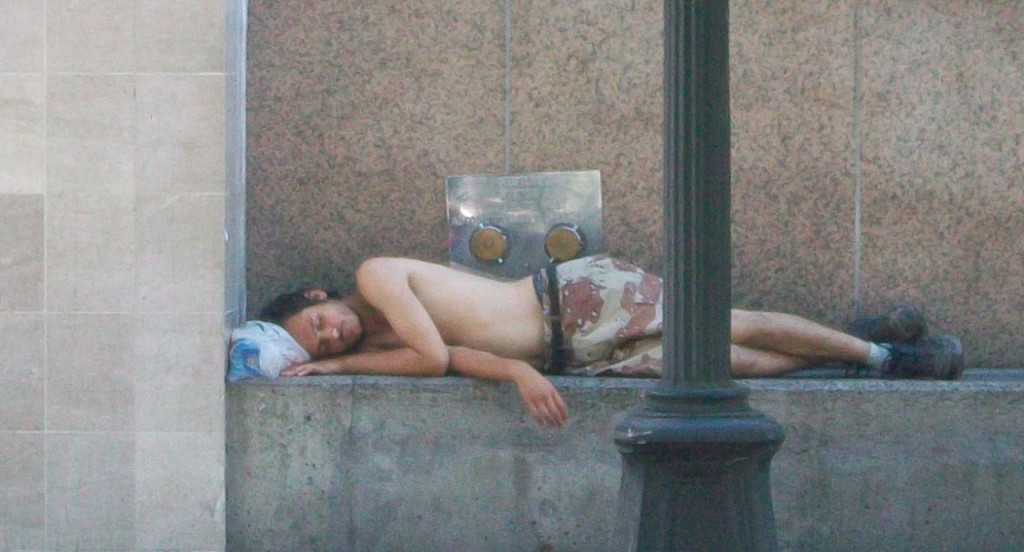A guest post from Jacque that I think really captures the spirit of Twelve Lunches. Originally published February 17, 2011.
I wasn’t driving. My boss had borrowed her husband’s SUV for the day so the four of us could ride together. . .. . .. . .along with all the food. We were a car full; four professional women, four crock pots of home made chili, four pans of corn bread, six pounds of coleslaw, sour cream, shredded cheese, three dozen Costco cookies and a case of fizzy water.
From my back seat vantage point I noticed a large cross on the side of a painted stucco wall. The tired structure was sandwiched between two larger buildings, fashionable late comers to this sketchy part of town. People waiting for their bus watched with interest as we parked and piled out of our ride. They were standing because the bus stop bench was doubling as a bed. Of course, the sidewalk was also multi-tasking, and various other vertical surfaces seemed to be involved in the kindly act of holding people up.
A man approached us and introduced himself. Shane seemed happy, but his teeth told the story of a hard life. He carried food as he led us into the rehabilitation facility. We snaked through narrow hallways to the kitchen, which looked exactly as you’d expect. He explained the mission of the center as an “on demand” drug and alcohol rehab program. “It doesn’t get much lower on the ladder than this place. We take anyone who shows up, regardless of their financial situation.” Shane went on to recount his own rock bottom moment, living under park bushes, addicted and despondent. He had come to this place and committed himself to the program, and was now a graduate of the addiction recovery center and working toward ending his homelessness.
I glanced at my co-workers, eyes downcast. I understood. Listening to Shane bare his soul seemed almost voyeuristic. I mean, aren’t there some things a man shouldn’t have to tell? I guess it all depends on your perspective, because Shane spoke with pride of his battle with addiction. He seemed acutely aware of his “on borrowed time” status, but in a grateful, defiant kind of way.
We put on our aprons and set out the food. The faces that passed my cornbread station were a mix; some hauntingly thin, several very young, black and white, all expressing gratitude. Shane had invited us to eat with them, and once everyone had been served I grabbed a bowl and served myself some chili, took a piece of corn bread and a cookie and headed for a table. I asked a group with an empty chair if I could sit with them. A young man’s smile put me at ease and I settled in for lunch. I wasn’t sure what to say, but I needn’t have worried. David introduced himself and dove into conversation. Who had I been rooting for in the super bowl? What other sports did I like? Where did I learn to make corn bread? What company were we with?
We discussed the amazing career of Brett Favre and marveled that his best years came at an age when other quarterbacks were long retired. One gentleman suggested Favre to be the best quarterback to ever play. Another disagreed, then quickly returned to his chili.
When I mentioned my love for hockey, a man wearing a refrigeration service company baseball cap chimed in. He had arrived late for lunch with a serious case of the shakes. He was (I assumed) in his sixties, but looked much older. He spoke with pride of his hockey playing sons and cursed the absence of an NHL franchise in our town. My heart ached to see this man, obviously existing on the fringes of society, who should be spoiling grandchildren and basking in his golden years, but was instead fighting demons and struggling to survive.
David’s voice yanked me back into the moment. “Will you be coming back, Jacque?” I explained that our office would be bringing lunch on the second Wednesday of every month. David looked right at me. “Will YOU be coming back?” His blatant desire to see me again caught me off guard. I wondered how many people like me passed through this place each month; feeding, leaving, and never looking back. Surely, some of them return, right? It was then I realized that, far and away, the greatest price paid for addiction is loneliness.
“Yes, David, I’ll be coming back.”
